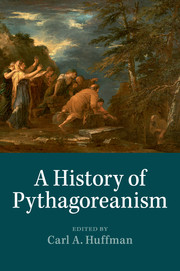Book contents
- Frontmatter
- Contents
- Contributors
- Abbreviations
- Introduction
- Chapter 1 Pythagoras
- Chapter 2 Philolaus
- Chapter 3 Archytas
- Chapter 4 Sixth-, fifth- and fourth-century Pythagoreans
- Chapter 5 The Pythagorean society and politics
- Chapter 6 The Pythagorean way of life and Pythagorean ethics
- Chapter 7 Pythagoreans, Orphism and Greek religion
- Chapter 8 The problem of Pythagorean mathematics
- Chapter 9 Pythagorean harmonics
- Chapter 10 The Pythagoreans and Plato
- Chapter 11 Aristotle on the “so-called Pythagoreans”: from lore to principles
- Chapter 12 Pythagoreanism in the Academic tradition: the Early Academy to Numenius
- Chapter 13 The Peripatetics on the Pythagoreans
- Chapter 14 Pythagoras in the historical tradition: from Herodotus to Diodorus Siculus
- Chapter 15 The pseudo-Pythagorean writings
- Chapter 16 Pythagoreans in Rome and Asia Minor around the turn of the common era
- Chapter 17 Diogenes Laertius’ Life of Pythagoras
- Chapter 18 Porphyry's Life of Pythagoras
- Chapter 19 Iamblichus’ On the Pythagorean Life in context
- Chapter 20 Pythagoras and Pythagoreanism in late antiquity and the Middle Ages
- Chapter 21 Pythagoras in the Early Renaissance
- Bibliography
- General index
- Index locorum
- Greek index
Chapter 7 - Pythagoreans, Orphism and Greek religion
Published online by Cambridge University Press: 05 May 2014
- Frontmatter
- Contents
- Contributors
- Abbreviations
- Introduction
- Chapter 1 Pythagoras
- Chapter 2 Philolaus
- Chapter 3 Archytas
- Chapter 4 Sixth-, fifth- and fourth-century Pythagoreans
- Chapter 5 The Pythagorean society and politics
- Chapter 6 The Pythagorean way of life and Pythagorean ethics
- Chapter 7 Pythagoreans, Orphism and Greek religion
- Chapter 8 The problem of Pythagorean mathematics
- Chapter 9 Pythagorean harmonics
- Chapter 10 The Pythagoreans and Plato
- Chapter 11 Aristotle on the “so-called Pythagoreans”: from lore to principles
- Chapter 12 Pythagoreanism in the Academic tradition: the Early Academy to Numenius
- Chapter 13 The Peripatetics on the Pythagoreans
- Chapter 14 Pythagoras in the historical tradition: from Herodotus to Diodorus Siculus
- Chapter 15 The pseudo-Pythagorean writings
- Chapter 16 Pythagoreans in Rome and Asia Minor around the turn of the common era
- Chapter 17 Diogenes Laertius’ Life of Pythagoras
- Chapter 18 Porphyry's Life of Pythagoras
- Chapter 19 Iamblichus’ On the Pythagorean Life in context
- Chapter 20 Pythagoras and Pythagoreanism in late antiquity and the Middle Ages
- Chapter 21 Pythagoras in the Early Renaissance
- Bibliography
- General index
- Index locorum
- Greek index
Summary
Pythagoreanism and Orphism: introduction
At the end of antiquity the relationship between Orpheus and Pythagoras seemed unproblematic. These two founding figures of Greek culture were thought to proclaim the same theological and metaphysical doctrines, although formulating them in different genres. Proclus, writing a millennium after Pythagoras founded his association (hetairia), declares that
all that Orpheus transmitted through secret discourses connected to the mysteries, Pythagoras learnt thoroughly when he completed the initiation at Libethra in Thrace, and Aglaophamus, the initiator, revealed to him the wisdom about the gods that Orpheus acquired from his mother Calliope.
(In Ti. 3.168.8 Diehl)For Proclus, just as for his teacher Syrianus, Plato expresses the very same teaching in his dialogues. The Muse Calliope, Orpheus, Aglaophamus, Pythagoras, the Pythagorean Timaeus, and Plato are links in the unbroken chain of transmission of divine wisdom that constitutes the backbone of the Greek philosophical tradition and is at the same time the foundation of the right religious attitude towards the gods.
Proclus reproduces here almost verbatim a text that Iamblichus quotes from a work called Sacred Discourse (Hieros Logos), in which Pythagoras, its purported author, gives a first-person account of the story (Iambl. VP 146–7). The quotation enables Iamblichus to demonstrate that the core of Pythagorean theology, which takes numbers to be the divine first principles, as well as the exemplary piety of Pythagoras and his followers manifested in their religious taboos and precepts, issue from Orpheus’ teaching. “If someone, then, wishes to learn from whence these men received such a degree of piety, it must be said that a clear model for Pythagorean theology according to number is laid down in (the writings of) Orpheus” (Iambl. VP 145, tr. Dillon and Hershbell, slightly modified).
Keywords
- Type
- Chapter
- Information
- A History of Pythagoreanism , pp. 149 - 166Publisher: Cambridge University PressPrint publication year: 2014
- 9
- Cited by



